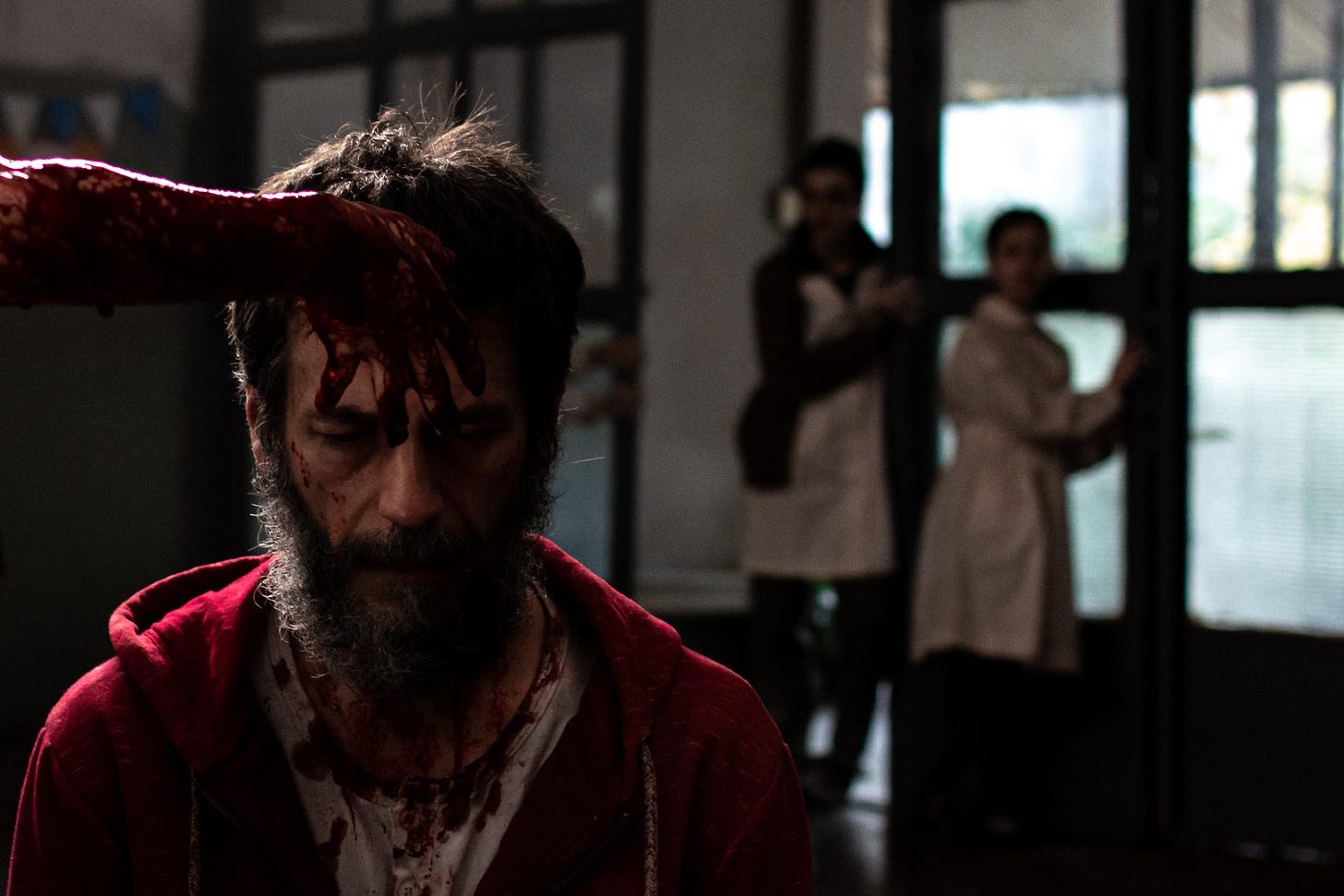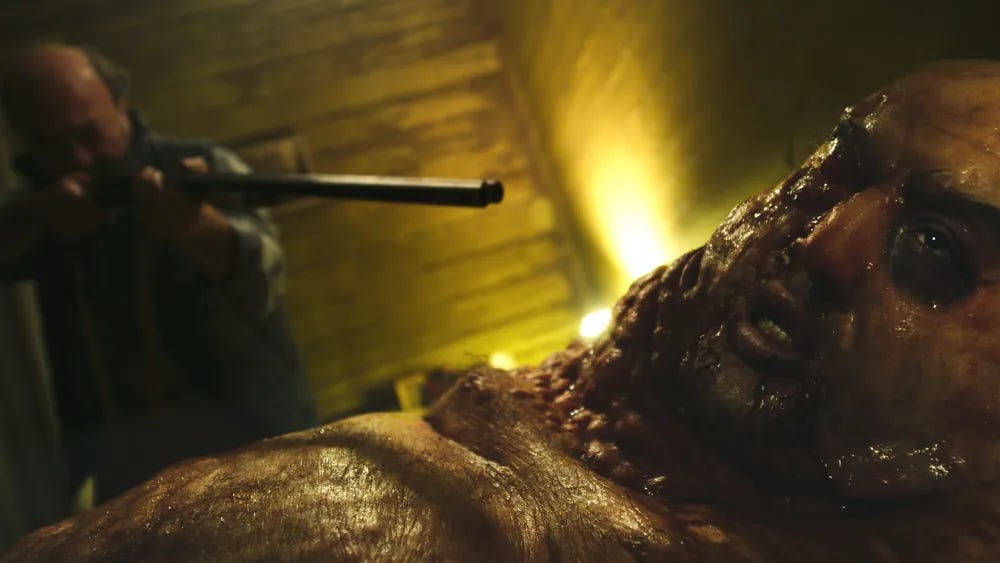When Evil Lurks Makes Evil Smart.
Too smart.
Hey, it was Halloween yesterday! I celebrated by watching a horror film, and reviewing it. A bit late, but you know, for horror fans, Halloween is all year.
___
I liked When Evil Lurks, but I didn’t love it. That’s somewhat out of sync with the critical consensus,which has been fairly ecstatic. I think that’s because of the subgenre. Most people have identified this as a mix of demonic possession, zombie films, or even folk horror. And it is! But it’s also got a big helping of slasher mastermind, a la Silence of the Lamb and the Saw films. And the slasher mastermind is my very least favorite kind of horror.
Having said that, it's easy to see why most viewers haven’t linked this to Saw; the signals are all wrong. Instead, Demián Rugna gives us a setting and a background that remains difficult to parse even as we learn more about it. The film is set in a rural town (in Argentina?) that, at some point in the not too distant past, has begun to experience an infestation of demonic possession. The Rotten infect more or less at random, and then must be disposed of by cleaners, lest they get free of a single body and do…well, horror movie shit.
The protagonist of the film is Pedro (Ezequiel Rodríguez) a small-time farmer who lives with his brother Jimmy (Demián Salomón) on a tiny plot of land way out in the middle of nowhere. The two brothers discover a dead body, which turns out to have been a cleaner on his way to exorcise a demon from Uriel, a man who lives with his mother and brother in a neighboring farm. Pedro tries to report Uriel to the police and health authorities, but they don’t want to be bothered—perhaps because they hope the Rotten will drive Ruiz (Luis Ziembrowski), who owns most of the land in the area, off his property so the government can take it. Ruiz decides to move the body. And things head from there, as you’d expect, to hell.
As other reviewers have noted, the film is hard to detach from our own experience of plague. The Rotten are containable if people work together and follow carefully delineated taboos—don’t use electric lights, don’t shoot the Rotten with guns, wait for the proper authorities.
But, as we’ve learned to our sorrow, working together and performing simple rituals (masking, testing, vaccination) isn’t so easy. Everyone knows the Rotten are dangerous, but they insist it’s a problem that happens somewhere else, in the distance. Pedro is dismissed as paranoid and untrustworthy. In one excruciating scene, Pedro’s mother enumerates the taboos to keep the Rotten away. When she gets to the last one—don’t say their names—she starts making a game out of naming various devils; Lucifer, Beelzebub, Azrael. Pedro’s autistic son, starts to say that last one over and over, which tells you which devil we’re dealing with. For all the good it does us.
Azrael isn’t the real villain, though. We are. That’s one of the persistent metaphors of zombie films, and of possession films too—we’re our own worst enemies. It’s just us tearing each other’s throats out, running each other down with cars, calling each other up and saying the absolute cruelest things we can to each other. Even our love for our children can be weaponized to do the devil’s work.
The movie is very inventive in the horrific, oozing retribution it allows its characters to inflict on themselves. It reminded me of the extravagant recursive sadism of Rob Jabbaz’s amazing The Sadness.
There’s an important different though. In The Sadness the plague just is; there’s no victor because it’s not a plot. But in When Evil Lurks, the nightmare is orchestrated. Azrael (if that’s his name) sets everyone up. He manipulates Pedro at great length and over great distances. The movie becomes less about the horrible ways we wound ourselves, and more about the horrible cleverness of this monster who’s out to get us. He’s John Kramer or Hannibal Lecter with superpowers. And as with John Kramer and Hannibal Lecter, you wonder why, if he’s that all knowing and clever, he’s bothering to torture this random schnook.
He's not just torturing some random schnook, of course. He’s creating a horror movie. Azrael is the director, which means that the movie becomes an extended exercise in the creator patting himself on the (bloody) back. As with The Birds or The Shining, the movie urges you to marvel at its intricate mechanism of cruelty. The fun is in watching the characters moved about the screen like actors, emoting towards their inevitable doom.
I’m not saying that evil doesn’t exist. There are definitely evil people out there, and sometimes we even put them in positions of authority and power.
They aren’t supergeniuses though. They’re just…well, like us, petty and foolish, as likely to do harm through fucking up as through successfully concocting elaborate schemes. Zombie horror is about how stupid evil is, and about how stupid we all are, which feels right. Lecter horror is about how smart evil is—and how smart the director is for thinking up something this smart. I can admire the mechanism. But it’s too glib for me to quite trust it.





Oh this is brilliant! I have a post brewing about the way we treat real life villains as if they're movie villains, and this point about smart versus stupid is just it. Evil masterminds are ultimately not as interesting because they're not real. But regular human hubris is quite real and relatable — and gets us into far more trouble in the long run.
:: Lecter horror is about how smart evil is—and how smart the director is for thinking up something this smart. I can admire the mechanism. But it’s too glib for me to quite trust it.::
This is the problem with people not Thomas Harris trying to write their own Hannibal Lecter, and it's a problem we've been seeing a LOT in movies! Lecter was never written to be the Master Supervillain, the Professor Moriarty/Dr. Mabuse/Fu Manchu/Lex Luthor/Ernst Stavro Blofeld who was out to destroy the hero. Kind of the opposite, in fact, because Hannibal Lecter, in his own Apex Predator way, is the hero's ally—not Moriarty, but STAR TREK's Q.
This reminded me of Voldemort in the Harry Potter books, whose motives are to 1) Destroy Harry, 2) Conquer the Wizarding World, 3) Destroy Harry, 4) Burn Down the Muggles' World Altogether, and 5) Destroy Harry. After he's accomplished all that, then what's he going to to do with his life—take up a piracy franchise?
While the hero might hunt Lecter, that's always alongside her's/his's main objective, which is usually to save somebody's life. I think you don't like Lecter because you're not seeing Lecter, you're seeing the cheapo store brand knockoffs written to ultimately destroy the hero because...reasons! You might like the character better if he (and I'm using "he" because as far as I can tell, this character is always a man) wasn't really destroying the hero's life, but...helping her/him in a way the hero never asked for.
Thomas Harris never wrote Lecter to be a realistic villain, he wrote him to be a fantasy helping the hero hunt far more realistic evil—all of whom are, as you said ,"petty and foolish, as likely to do harm through fucking up as through successfully concocting elaborate schemes." (I kind of liked how Sherlock Holmes in ELEMENTARY described serial killers as "onanists and mouth breathers", but that could be because of the withering contempt Jonny Lee Miller's Holmes gave it.) This Azrael is the writer taking a lazy shortcut because, well, "the movie has to happen"....